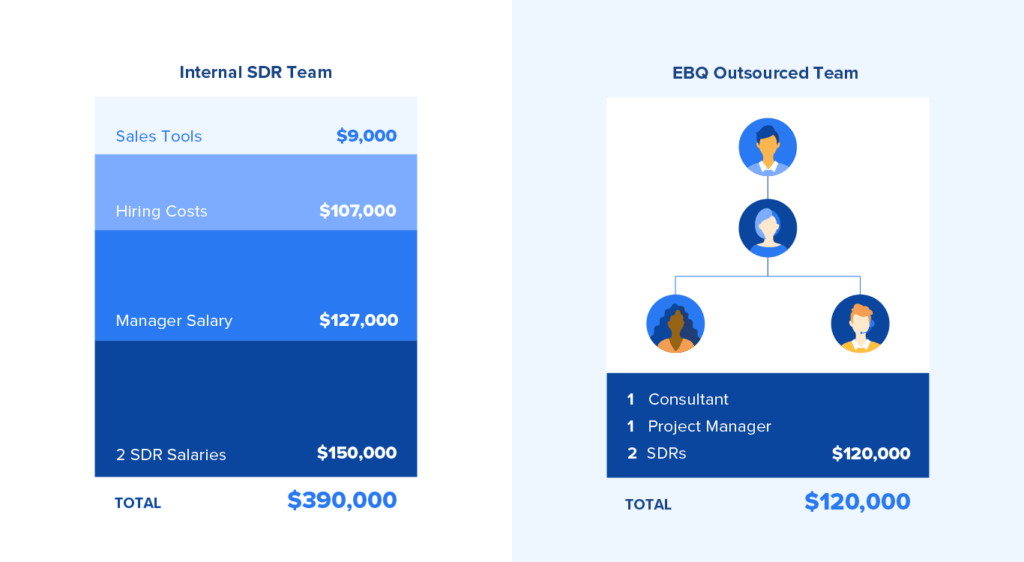Outsourcing B2B Inside Sales: 4 Factors to Consider


Tim Edwards
This post was originally published in July 2019 and has been updated for accuracy and comprehensiveness.
Many organizations are choosing to outsource their B2B Inside Sales department to shorten the sales cycle, boost conversion rates, and improve productivity.
However, company leaders should know the challenges they must address before choosing an outsourced firm and negotiating a partnership.
In this post, we’ll outline the 4 factors that you should consider when choosing your outsourcing partner. These factors are:
- Reporting Transparency
- Alignment with Your Organization
- Success Accountability
- Outsourced Inside Sales ROI
First, let’s dive into what is an outsourced inside sales rep.

Download the Ultimate B2B Appointment Setting Guide
Download the B2B Appointment Setting Guide to learn how to properly prospect and cold-call best practices.
What is an outsourced inside sales rep?
An outsourced inside sales rep — also known as an appointment setter or sales development representative — works on your company’s behalf to prospect, qualify leads, set sales meetings, and win you new business.
Hiring an inside sales rep has its inherent advantages. For starters, you can reduce your B2B lead cost significantly. Outsourcing allows you to focus on your bread and butter as the reps work hard to widen your sales pipeline. You can also take advantage of your outsourcing partner’s proven processes to create effective workflows — which takes the guesswork out of your sales cycle.
So with all of these benefits in mind, what critical questions should you ask before choosing your partner?
1. Reporting Transparency
Your first question should be, “How much control will you have over your outsourced sales reps?”
You want to be sure that your sales team is representing your brand properly, following the appropriate processes in place, and spending their time wisely pursuing leads that are a good fit for your company.
A good outsourced firm will prioritize transparency and frequently review their progress with you. That way, you are granted control over how their efforts should be adjusted and executed.
Speaking of transparency, you should also question how your outsourcing partner’s results are tracked and reported. Make sure to look for a firm that is willing to work directly out of your CRM instance that gives you visibility into each step of the sales process.
By tracking each inside sales KPI, you’ll be able to analyze their performance and make adjustments to your strategies. This close collaboration will empower both you and your partner to create an efficient sales process that works for your unique business offerings.
From there, you can compare your team’s success rate with industry benchmarks to evaluate their success. By knowing which part of the process needs to be fixed, you can adjust the outreach strategy and potentially capture more opportunities with your outsourced team.
2. Alignment with Your Organization
When choosing your outsourced firm, make sure to evaluate how they’ve been able to align their reps with their clients’ established processes. The last thing you want is misalignment over messaging, your buyer persona, or what exactly is considered a qualified prospect.
Messaging misalignment can have detrimental effects on your company, as it makes your company look unprofessional and disorganized. Outsourcing can further complicate things — especially if you have a highly complex product or service to sell. The right outsourced sales firm will work closely with your internal leadership to integrate fully with your processes and strategy.
Your outsourced sales firms should meet with you regularly to review their progress and continuously improve on your strategy. When choosing an outsourced firm, we suggest finding out the specifics of the onboarding process beforehand. Some green flags to look for in the firm’s onboarding process are:
- Process overview: A full overview of their proven sales process to give you a transparent look into what day-to-day duties your outsourced reps will perform
- Client overview: A comprehensive briefing on your company, your product, and your messaging that will guide all efforts for the outsourced firm
- Qualification criteria: Discussion of what is considered a qualified prospect or opportunity for your company, as well as any other discovery information you expect
- Account segmentation: An overview of the state of your database, how it is segmented, and a breakdown of the territories you serve
- Marketing support: A rundown of what marketing initiatives, if any, your company is executing that generate leads for the outsourced team and how intent can be inferred from those initiatives
- Technological alignment: Integration of the outsourced firm through email addresses with your company domain, access to your CRM, access to your reps’ calendars, and an overview of which tools will be used for selling and reporting performance
The bottom line is to choose an outsourced inside sales team that integrates seamlessly with your organization and has a strong onboarding process for their reps to avoid future headaches.
3. Success Accountability
Another question companies often ask themselves when thinking about outsourcing sales is, “Why should we trust our sales in the hands of another company?”
You may think that an outsourced sales company has less of a stake in your success. However, the reality is that outsourced firms are incentivized to help you succeed. To them, retaining your business as a client is just as important as winning new business.
This is especially true for outsourced sales firms who offer annual contracts because keeping clients satisfied in the long term is the main objective. Compare these firms to ones that pay on a per lead, per sales appointment, or commission basis.
Pay-per-lead firms are more likely to prioritize sending you a large volume of appointments and opportunities — no matter the lead’s quality. This is why we recommend a time-based outsourced firm that acts as more of a partner than just a vendor.
A good outsourced sales firm will act as an extension of your company by proudly representing your brand and product as if it were their own.
Beyond finding a firm with time-based contracts, focus on how they represent their brand. Consider their performance during the sales process of pursuing you as a prospect, look at their onboarding process, and look at the overall effort they put into providing value for their leads and customers.
4. Outsourced Inside Sales ROI
One of the most common concerns organizations have when considering outsourcing is, “How much return can I get in investing in a B2B outsourced inside sales team?”
When determining which outsourced firm you should go with, do your due diligence to get an accurate figure of what different service providers will charge. Next, make sure they give you an accurate estimate of the value they will deliver.
- How much pipeline will they build for you?
- How many qualified appointments can they deliver?
- How much will they ultimately contribute to your revenue?
To accurately anticipate the ROI you’ll get from outsourcing your sales, measure the cost of the service against the amount of value you’ll receive from it. You can do this with our ROI Calculator Excel Template.
Talented sales reps and SDRs are in high demand these days, so retaining an effective sales team can be quite costly. You’ll find that many outsourcing firms can provide experienced sales talent at a fraction of the cost of building an inside sales team internally.
Take a look at the cost comparison for an outsourced team of SDRs vs. building that team internally:

Take into account the following stats about internal SDR teams that The Bridge Group found in their SDR Metrics Report:
- The base salary for SDRs in 2018 averaged $48K, and OTE can amount to $75k per SDR
- The average salary for SDR managers totaled $127k per year
- Companies report on average spending $371 per SDR per month on technology alone
Building and maintaining an internal team of SDRs alone will strain your budget quickly. On the other hand, outsourcing your inside sales gives you access to a team of experts at a fixed cost. You don’t have to invest in expensive sales tools, and many outsourced sales firms even provide a built-in management structure so that you don’t have to keep somebody micromanaging the team on your payroll.
How to best do inside sales
If you want to do inside sales correctly, you need to partner with an outsourced inside sales team that will help you plan and execute a strategy tailored to your solution and closely collaborate with you.
To find the right partner, make sure you ask your firm about their:
- Reporting Transparency
- Alignment with Your Organization
- Success Accountability
- Outsourced Inside Sales ROI
If you’re looking for guidance and support when it comes to inside sales for your company, don’t hesitate to contact EBQ. We’ve worked with thousands of clients who outsource their sales and sales development, and many of them end up seeing a 200% ROI on average.
